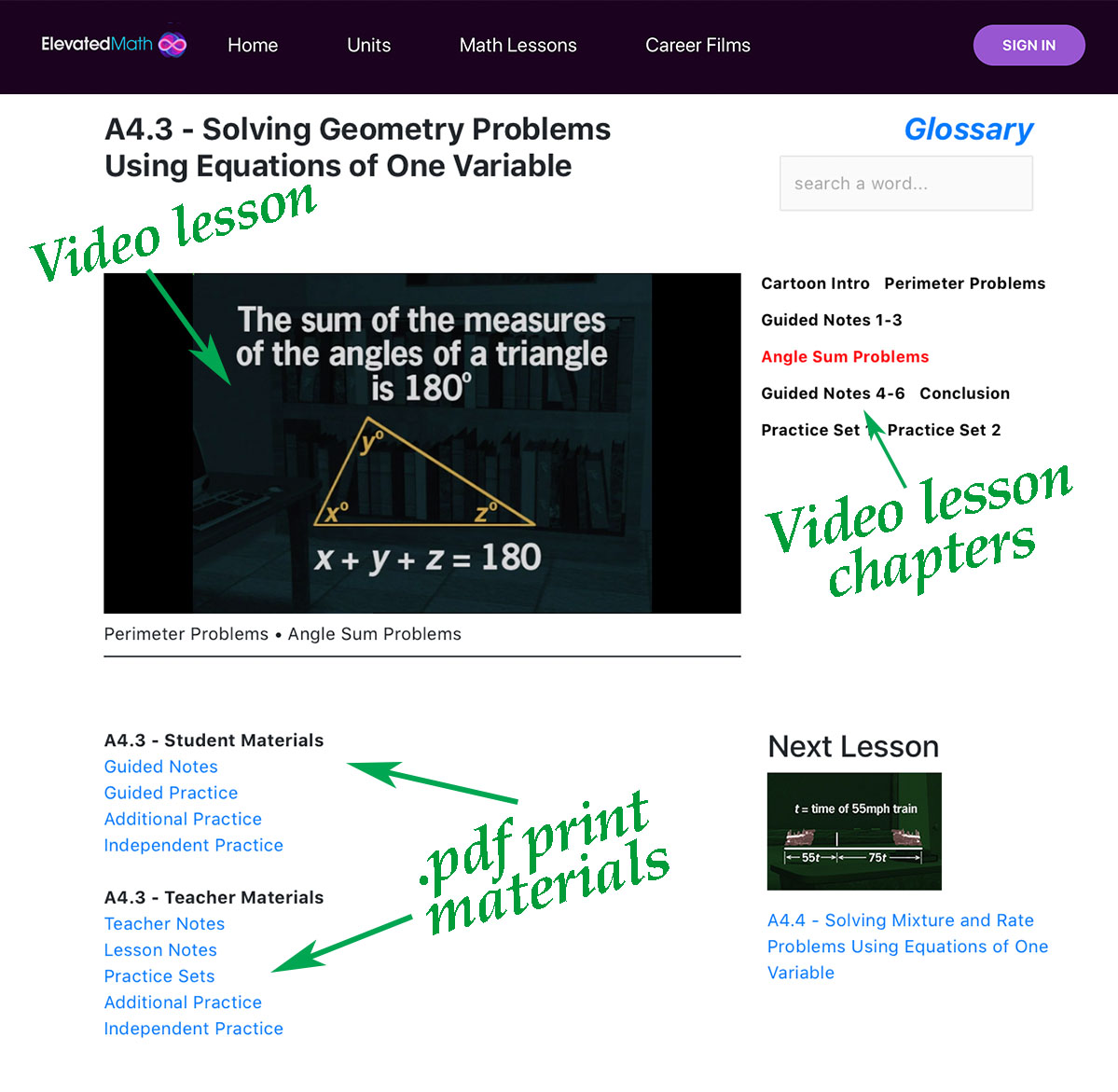Herein contain requirements for instructors (including parents) to teach math to their students with the Elevated Math program.
First Requirement
Instructors should read the Teacher Notes before playing the lesson, and explain the “Get Started” ideas to the student.
Elevated Math provides all the tools for teaching two years of math, pre-algebra and algebra. To use these tools takes work. Watching the videos is not enough. Find worksheets for the Guided Notes and Practice Problems of each lesson below the videos on the website. Instructors should print these out and give them to the student so he/she can work out each problem when the video pauses.

Sample Video Page at ElevatedMath.com
Second Requirement
Take a short break between chapters while watching the video. This is a good time to explain the Common Errors students might encounter in the math lesson they are watching. (These Common Errors are also listed in the Teacher Notes.)
Third Requirement
When the video ends give students the Independent Practice problems for solving. Check their answers with the provided Keys. The results let you to see required review. Play a chapter again if necessary. Need more problems? Find them in the Additional Practice Problems.
All print material is on the lesson’s video page. The exceptions are the module tests, which are at the end of each Unit. Have the students take one of these tests after they have completed a module (4-7 lessons). Based on the result of the module test, a student might need to review part of a lesson. Should you need to give the test again, a second module test is provided.
Sample Lesson
No need to subscribe to see a sample lesson. One is on the homepage of ElevatedMath.com. Check it out. And remember when you subscribe you have 172 more lessons just like it.
Why Doesn’t Elevated Math Have More Interactive Tools
Learning requires effort – more than most people think. Unless you have highly motivated and self-driven students (which is rare), parents and teachers need to direct their study. Why you might ask, didn’t we make more interactive tools as other online programs have, where a student can answer a question online and then if the answer is correct he/she gets a harder problem? Or if the answer is incorrect, an easier one? Wouldn’t this make it easier for the instructor? Yes, it would make it easier, but it doesn’t help the student learn better. In fact, keeping everything on a computer screen impairs comprehension.
Studies show that most students favor using a mixture of paper and computers as this Scientific American article explains. Also, students taking notes exclusively on laptops perform worse on conceptual questions than students who take notes longhand. It stands to reason the same holds true for solving math problems. They need to solve the problems on paper.
A 2016 Dartmouth study found “when learning, it may be in your best interests to digest the information from multiple media forms.” The results of this study show that computer screens impact abstract thinking. Therefore, students can understand abstract math concepts better if they work out problems on paper rather than on a computer or tablet.
Working Hard Motivates Students
Finally – and we have no studies to support this next conclusion, only personal experience – the more students see their parents and instructors working hard to further their education, the more students learn. For years, I served on PTA’s and then on a school board where I could clearly watch the students of parents who took an active role in their kid’s education. These students got better grades, good colleges admitted them, and they succeeded in life. Why was this, I wondered? Then the answer dawned on me. These students saw the importance of their education, and school, and studying because their parents demonstrated its importance. They were working hard for them.
Conclusion
So, if you intend not to devote time and effort to helping your student learn basic math, geometry and algebra concepts found in the Elevated Math lessons – lessons that lead to success in higher math classes, achieve good scores on SAT/ACT tests, admission to better colleges and success in life – do NOT subscribe to ElevatedMath.com. You are wasting your money.
